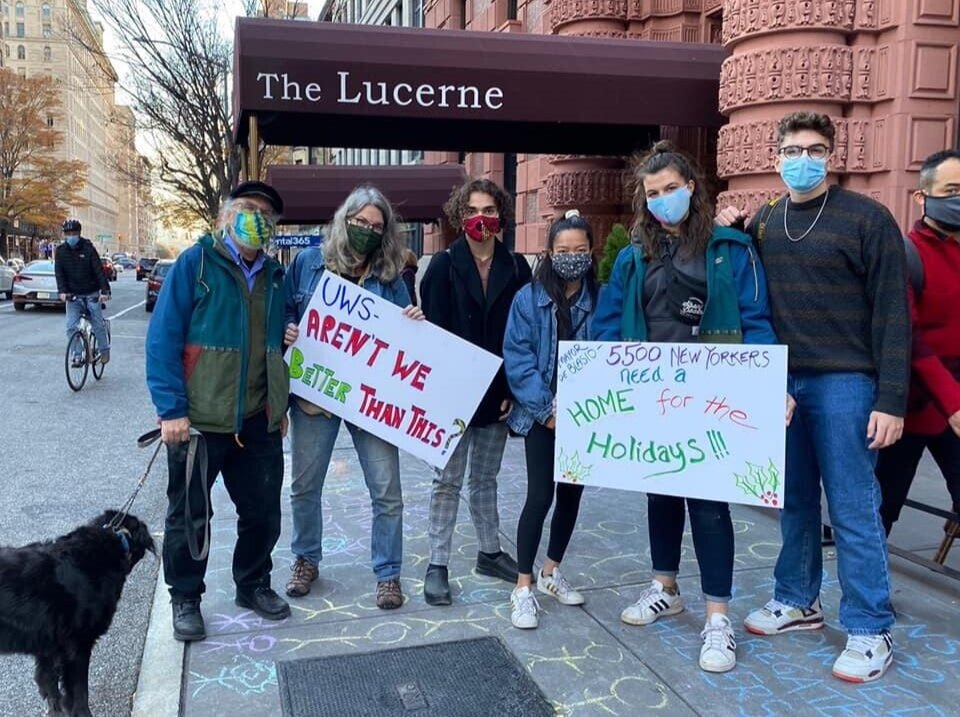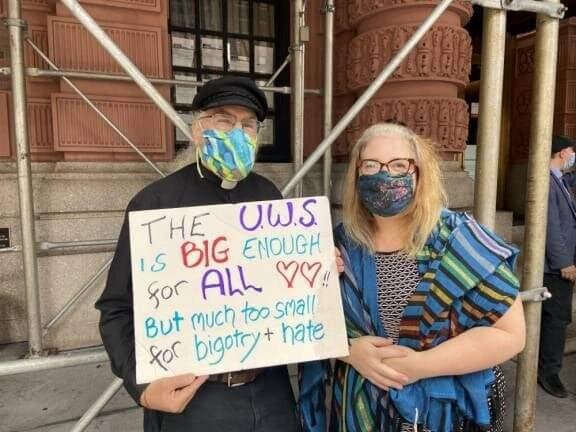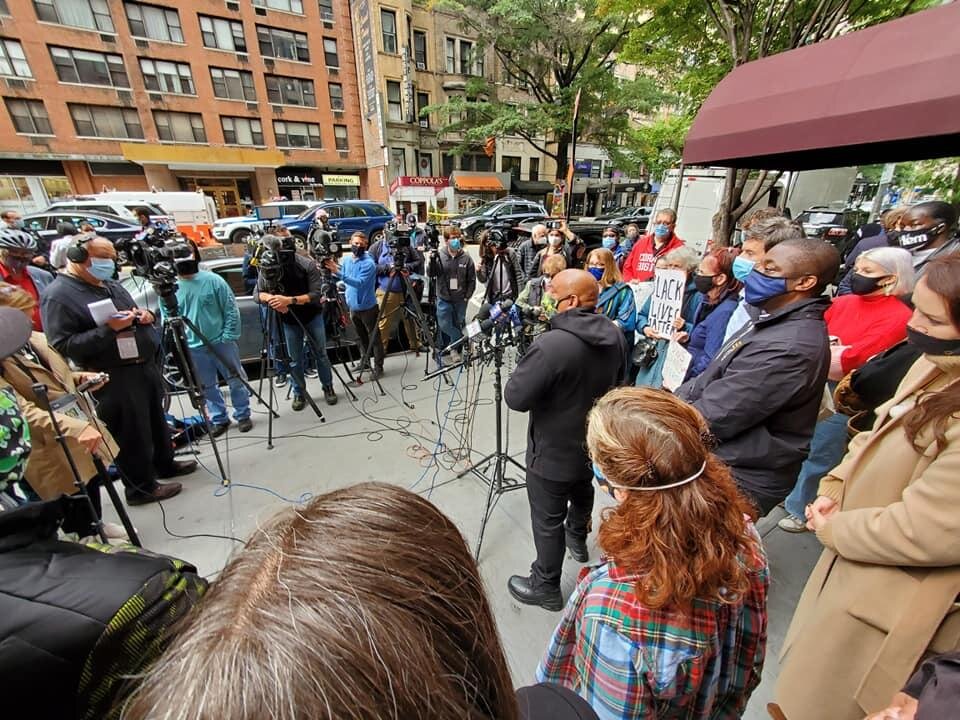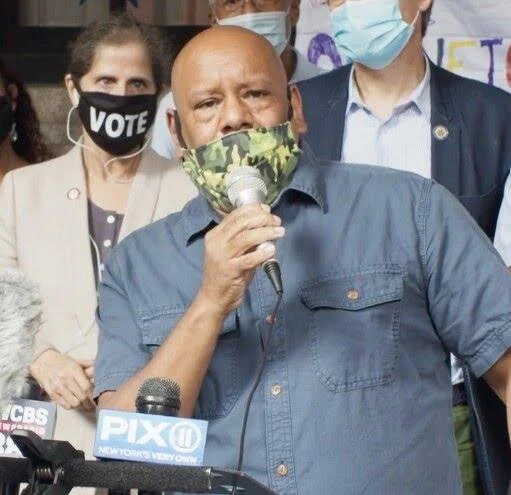Housing Justice on the Upper West Side NYC
By K Karpen, Senior Pastor, St Paul & St Andrew UMC (A Justice-Seeking Congregation)
St Paul & St Andrew UMC members
A protest in support of the homeless residents
Rev. K Karpen & Rabbi Lauren Grabelle Herrmann
What happens when 283 homeless New Yorkers with substance abuse disorders suddenly move into a luxury hotel on the famously (supposedly) liberal Upper West Side of Manhattan? And in the middle of a pandemic? Well, it’s complicated.
The first I heard of this situation was from a friend, Rabbi Lauren Grabelle Herrmann, rabbi of a synagogue called SAJ: Judaism for All. Her schul is down the block from us, and we had been collaborating on a lot of anti-racism work. Her message read, in part:
…a major backlash against the housing of homeless men at a neighborhood hotel has erupted on the Upper West Side. Moving these men to this location is part of a city-wide response to the public health crisis of unhoused people being on the streets or in shelters where social distancing is not possible.
Elected officials, local and city-wide, are hearing from angry Upper Westsiders who are claiming that this move undermines their safety and their children's safety, and threatens the character of the neighborhood.
There are many of us who believe that housing the homeless is a public health need AND a moral necessity. There are those of us who want to see that these men are talked about and treated with dignity, even as we address any particular concerns of our congregants. There is also a race component that needs to be addressed.
Sidewalk Chalk “Art Protest”
The race component was obvious. In a neighborhood that’s nearly 75% white, where the average rent for a (mostly small) apartment is $4200/month, the sudden influx of 283 black and brown homeless men stood out.
Almost instantly, a group organized called Upper West Siders for Safer Streets, which raised more than $100,000 and hired a former NYC deputy mayor (under Rudy Giuliani, of course) to pressure the City to move the men away. The men were harassed, photographed, jeered at, and pushed away from public spaces.
But something else happened as well. Local churches and synagogues joined quickly with some of our neighbors to welcome the men, get to know them personally, see what they might need, and pressure our elected officials to let them stay.
Quickly, leadership emerged from among the men themselves. When Mayor de Blasio bowed to pressure and announced his intent to relocate the men to a hotel downtown, three of them stepped up to sue the city to stop the action.
Shams, aka Da Homeless Hero, speaks at a press conference
One of the three, Shams De Baron, aka ‘da Homeless Hero’, became a spokesperson for the group. At a march from the West Side to Gracie Mansion, the Mayor’s official residence, Shams spoke out against the Mayor’s actions:
I felt traumatized at being dehumanized, moved around like we were pawns on a chessboard. It disturbs me that the Mayor seemed to echo the sentiments of those who have espoused racist, hateful and unwarranted views about a vulnerable and voiceless population.
Our own congregation, St. Paul & St. Andrew UMC, quickly became involved in the struggle for justice for these new neighbors of ours. Our church is just a few blocks away. Despite the pandemic, our people showed up at protests and press conferences. Soon, our people were baking cookies, making signs, chalking welcoming messages on the sidewalks in front of the Lucerne hotel, contacting elected officials. We joined a new organization called the Upper West Side Open Hearts Initiative. We offered safe indoor gathering space.
The needs of the hotel residents go beyond the physical and political. At the request of the residents, area clergy began organizing ‘Spiritual Walk and Talks’ through the streets and nearby parks, where the men could pray, share their stories, ask for solace, laugh, and know they are treasured by so many of their neighbors. On one of these walks, Corey, a young man not long out of a long prison term, shared his frustration at his difficulty obtaining SSI benefits, despite a disability stemming from beatings and harsh treatment by the guards during his incarceration. These Spiritual Walk and Talks provide an outlet and a caring, listening ear. A sense of community and solidarity.
Welcoming messages; Church members join a chalk ‘art protest’ in front of the Lucerne Hotel
Recently, the men of the Lucerne won a major court victory. They cannot be moved until May at the earliest. But there are other victories. A community of love and mutual support that formed out of what Shams calls the ‘trauma on top of trauma’ of being cast aside and ostracized. Churches and synagogues working together, despite the difficulties of Covid-19.
The homeless situation in our neighborhood didn’t begin with the move to the Lucerne Hotel. Like many places around the country, New York has seen a sharp rise in street homelessness as unemployment continues, wages are cut, and aid is delayed. Hunger, the companion of homelessness, is rising as well. Food for 5000 meals a day is distributed from our church; in December the meal count was over 299,000, the highest since we started a food pantry forty years ago.
The problems we face are real, and won’t be easily solved. But what a blessing to be in solidarity with other religious institutions, progressive neighbors, and the inspiring men of the Lucerne Hotel.
Pastors and Rabbis at the Lucerne Hotel
Shams at a protest
Serving breakfast to hotel residents
Cookies from the congregation













